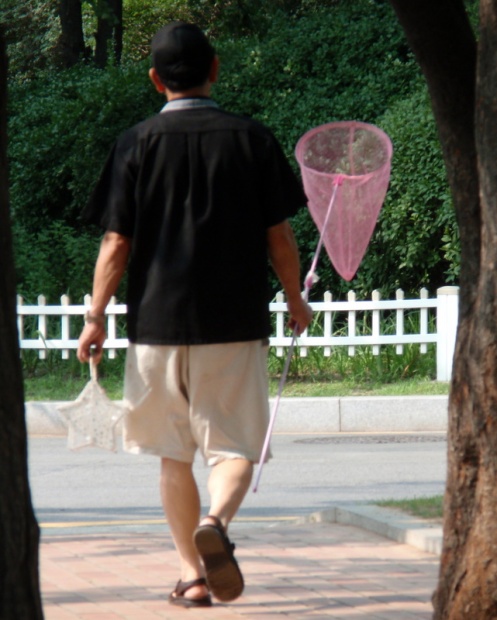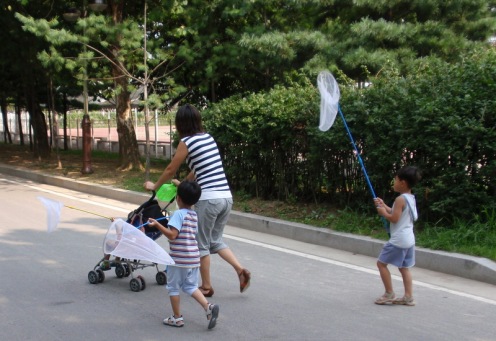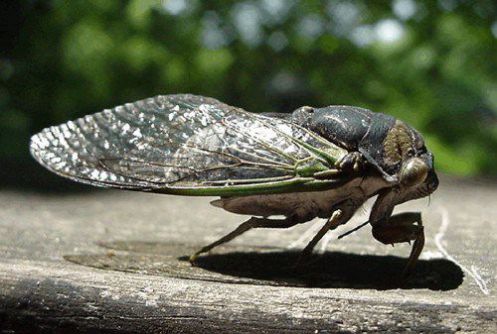The Noisy Cicada
Summer time in Korea is filled with the strange noise. It’s like a chirping, or a clicking… almost like the sound of leaves as the wind blows through them but extremely amplified in a rapid percussive manner. It comes in waves. Louder, softer, gone. Louder, softer, gone. Like the wind picks up then dies down. It took me a little bit to figure out what was going on, but it’s the noisy cicada bug.
I started seeing people along the tree lined streets, and in the parks, with nets and little cages. Mostly parents with their little ones, out for a cicada catching session. Then one of our students came to school late in the afternoon with his mom, and while she was consulting with our branch manager, he was showing off his little plastic cage with 2 burly cicadas inside. They’re pretty big bugs. But for as much as you hear them, you don’t see them so often, so it was cool that he had them at school for me to see. They are typically way up in the trees, and not very visible.


So I did my research, and here’s what I found about the cicada and its impact on South Korea:
Due to global climate change, the number of cicadas is on the rise, and becoming quite an irritant, especially at night, causing sleepless nights for many Koreans. The species of cicada in Korea chirps at 75 decibels. For comparison, the average loud cell phone ring is 70 decibels. Now imagine a ton of them going off at once. Many cicada larvae die during the winter, however global warming has enabled them to survive. In addition, the increase of broad leaf trees used in landscaping provides the perfect habitat for the cicada. This all leads to more and more noisy bugs.
Cicadas are chirping to find their mates. But… the city is too loud for them, so they chirp louder. Also, the increase in city light at night time is a major contributor to the noisy bug while the sun is down.
The noise they make is not caused by the rubbing of legs together, like that of a cricket. Cicadas have timbals on the side of their abdominal base. These regions of the exoskeleton base have thin membrane and thickened ribs. Contracting the internal timbal muscles produces the chirp. The interior of the male abdomen is hollow to amplify the sound.
Hopefully they’ll shut up when it cools down.



We have these freakin things in TX.. I hate them. I was first shocked by them, as you are, while I was in Japan for the summer of my Soph. year. They are very loud aren’t they? That is one thing I noticed when I spent 3 weeks up in Oregon this summer… It’s quiet there.
I love the Cicada sound. For me here in Tennessee, USA, it is the official start of the hot summer season. I heard my first one for the year yesterday. In a couple of weeks the waves of sound will be like listening in stereo, starting in the south and working as a wave to the north, an acre of Cicada in concert!
They haven’t started making noise in Seoul quite yet, but the humidity is here, and last night was the first lightning of the summer, so I’m sure the cicada is right around the corner
I live in Southern Spain and they are all around me, even in small town gardens. I love their sound and they stop when you get close but I never actually see one. Perhaps that’s good as they remain quite mystical to me!
I love cicada’s they are amazing here is a little fact for you all to know before you think about killing one. Some of them live up to 17 years in their larvae stage thats right 17yrs and by the time you see one they are almost dead. they live 17 years on or under the ground so when you think about it let them be as they only get a week or two mature life to sing in the sun before they’re done no pun lol quite literally
very good site